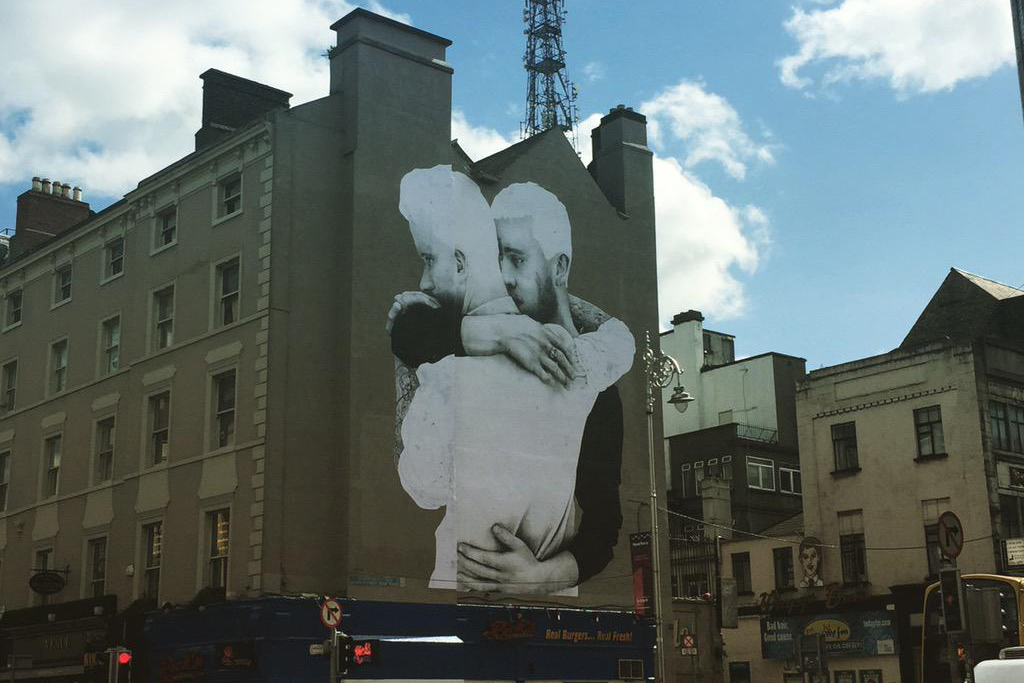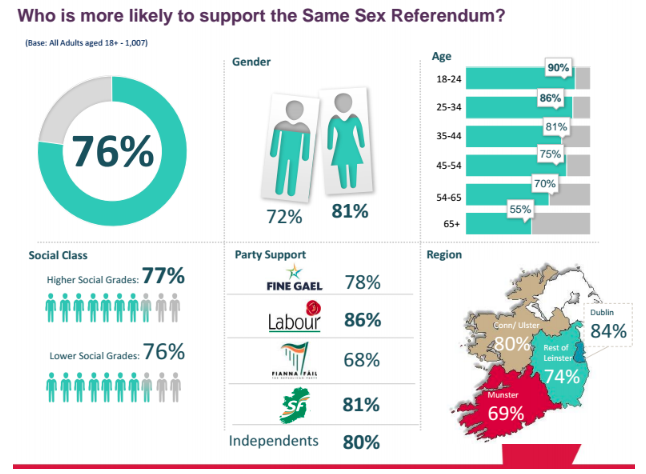How Did The Once Ultra-Catholic, Conservative Ireland Beat Australia To Same-Sex Marriage?
Early referendum results are predicting a landslide. Is our vote next?

With an estimated 3.2 million people casting their votes in yesterday’s referendum, it looks as though the Republic of Ireland will soon become the 19th country in the world to legalise same-sex marriage. Though the counting started just two hours ago, the affirmative is taking it out in a landslide.
I'm calling it. Key boxes opened. It's a yes. And a landslide across Dublin. And I'm so proud to be Irish today. #MarRef
— Aodhán Ó Ríordáin TD (@AodhanORiordain) May 23, 2015
BREAKING: Returning officer says early count at Dublin North Central shows 65-70% Yes. #MarRef http://t.co/Iivmre9uoy pic.twitter.com/9B4rdECLxk
— The Irish Times (@IrishTimes) May 23, 2015
Even prominent campaigners against marriage equality are conceding defeat.
Congratulations to the Yes side. Well done. #MarRef
— David Quinn (@DavQuinn) May 23, 2015
While this is a hugely historic moment for the country itself, it’s also seen enormous engagement from those all around the world. There are currently more than 130,000 messages of support under the hashtag #VoteYes and it — along with similar threads #ireland, #irelendvoteyes and #hometovote — has been trending in Australia for the past 24 hours.
Importantly, this vote is a milestone in itself: it looks to be the first time same-sex marriage has been legalised by a public vote instead of legislature or the courts. And, for Australians — an estimated 72 percent of whom support legalisation — this idea is an interesting one; an inspiring example of real power being given to the people.
But, tangled up in all this support, is a real sense of anger about the inaction of our own country on marriage equality. Earlier this year we officially became less progressive than Alabama on this issue as the US Supreme Court pushed for legalisation, and now we’ve fallen behind Ireland —one of the most notoriously politically conservative and religious places in Western Europe.
Ireland is definitely going to vote for same-sex marriage. Even the right wing parties are on board. Australia is going to look awful.
— Osman Faruqi (@oz_f) May 21, 2015
The once ultra-religiously conservative Ireland may be about to vote for marriage equality. Why do we suck much Australia??!!
— Mark Di Stefano (@MarkDiStef) May 22, 2015
If Ireland, a predominantly Catholic country, says yes to marriage equality today, Australia's politicians have no more excuses. #VoteYes
— Jill Stark (@jillastark) May 21, 2015
To better understand the issue, here’s a comparison of Australia and the Republic of Ireland. Whether successful or not, this vote was more than we’ve ever had.
–
Religion and Tradition
When people talk about the conservatism of the Republic of Ireland, it’s nearly always tied up in religion. And, while there’s not necessarily any connection between these two things in our society today, the strict social beliefs of Catholicism have been rooted in Irish culture for generations.
Specifically, the Irish constitution contains a number of explicit references to Christian religion such as “the Most Holy Trinity” and “Almighty God,” and all this sits alongside passages which advocate traditionally Catholic teachings. The text regards the family as “the natural primary and fundamental unit group of society” and pledges that the State must do all in its power to “guard with special care the institution of Marriage”; it condemns abortion in all cases except when the woman’s life is in danger; and it also included a prohibition on divorce.
Divorce was only legalised in 1996, and abortion remains illegal to this day.
Imagine if Ireland legalised same sex marriage and progressed towards legalising abortion in the same year. Sure we'd nearly be in 2015.
— Gal Pal Rachel Green (@infinityonhi) May 12, 2015
Like many countries, Ireland has seen an increasing number of people classify themselves as non-religious in recent years, however the overall stats reveal the majority remain unmoved. According to the nation’s 2011 census, 84.2 percent of the population identify as Roman Catholic. Catholicism is also our most popular religion in Australia, but with a comparatively low 25 percent of the population; a number which is only just in front of the 22 percent who classify themselves as non-religious.
Importantly, this doesn’t mean that 84 percent of the nation are against same-sex marriage. While it would have been that way a few generations back, the Catholic Church have now faced decades of sexual abuse scandals and completely lost their place as the nation’s moral authority. Commonly described as “disaffected,” modern Irish Catholics are often amenable to progressive causes, and with no cohesive social group pushing against the reform, marriage equality has taken off with a large number of people from all religious backgrounds.
In Australia, it’s a little different. The legislature and official documents surrounding marriage have long been divorced from this kind of religious sentiment, but despite the fact 53 percent of Australian Christians support marriage equality, its most vocal opponents are often affiliated with religious groups. People are still listening to Reverend Fred Nile for some reason, and the Australian Christian Lobby are behind the organisation which ran the Won’t Somebody Please Think Of The Children ads on Mardi Gras night earlier this year.
Add to this the fact that the Commonwealth of Australia decriminalised homosexuality just one year after Ireland in 1994, and legalised civil partnerships just a couple of years before them in the mid-2000s, it seems like we’re not all that different.
–
Public Consensus
Galaxy Polling from 2009-2012 estimates that 64 percent of Australians support marriage equality, and last year a Crosby Textor poll put that number up to a huge 72 percent. With these numbers, over the past few years groups like Australia Marriage Equality and GetUp! have been pushing for movement on the issue and in 2011 the latter’s “It’s Time” campaign became an international sensation, racking up an enormous 14 million views on YouTube.
Though social campaigns like this, protests and rallies have been a common occurrence for us over the past few years, Australia has never been able to push forward to anything quite like what’s happening in Ireland; a fact which is pretty strange considering our similar support base.
Though the final result of the referendum isn’t yet known, opinion polls have consistently predicted a “yes” vote for the Republic of Ireland. In January, as discussion on the matter was only just heating up, the predicted affirmative vote sat at a decisive 76 percent and it’s now tightened to a still-impressive 67 percent.

Via RedC Research.
Either way, those are the kind of numbers you can get excited about and Irish citizens have been eager to have their say. Irish celebrities like Colin Farrell, David O’Doherty, and Chris O’Dowd have all been active campaigners for the cause and — with postal votes disallowed in the referendum — hundreds of expats made their way home yesterday eager to be part of the decision.
Taking time out from his canvass today, @phlaimeaux stressed the importance of getting out to vote YES this Friday. https://t.co/8XpLh5ddte
— YesEquality2015 (@YesEquality2015) May 20, 2015
I flew from San Francisco to vote Yes today. No biggie. #hometovote
— Ali May (@alimayzing) May 22, 2015
Never been so happy to be at an airport gate. LGA to PHL to DUB to YES. #hometovote
— Belinda McKeon (@belindamckeon) May 21, 2015
In Heathrow airport waiting for a flight to Cork to go #hometovote #MakeGráThelaw pic.twitter.com/ST04TMUQ0t
— Debbie O'Neill (@debbiemoneill) May 21, 2015
This wave of #hometovote is like that scene in Braveheart when the cavalry that were hiding appear over the hill
— john burns (@JohnBurnsST) May 22, 2015
–
Government Support
So, here’s the big one. Obviously, public support for this issue can’t produce any real changes when both Australia’s major political parties actively oppose it. You’d think some basic knowledge of percentages or the electoral system would have changed at least one of their minds by now, and yet here we are. The Greens have always been on board, but the closest thing we had to decisive action from everyone else was when K Rudd decided to give his two cents after already being kicked out of the building.

Kev. Mate. Where were you a year ago?
Thankfully, Ireland don’t have this problem. Their President Michael Higgins somewhat diplomatically hasn’t offered his views on the matter, but Prime Minister Enda Kenny and former conservative President Mary McAleese are all on board. The Republic of Ireland is in the almost unprecedented situation of having all major political parties, many big businesses, media organisations, unions, and the police force all offering their support for marriage equality.
Of course, it hasn’t always been this way. It’s only 21 years since homosexuality was decriminalised and it wasn’t until 2011 that Ireland had their first openly gay members of parliament. Now, people like Labour Party representative John Daly are making passionate statements about homophobia during parliamentary sitting time, and the country have truly transformed themselves.
In Ireland the counting will continue into the night to confirm what everyone is pretty much already celebrating, but the fate of Australia is a little less clear. Should we be grateful for Glenn Lazarus and the well-meaning threat of his mankini, or should we be upset that this is the best we can do?
LGBT Community Changes Rainbow Symbol To Glenn Lazarus In Mankini: http://t.co/oiZTCwE68S pic.twitter.com/4VkzRUpb6f
— SBS Comedy (@SBSComedy) May 22, 2015
–
Feature image via Barry Malone/Twitter.